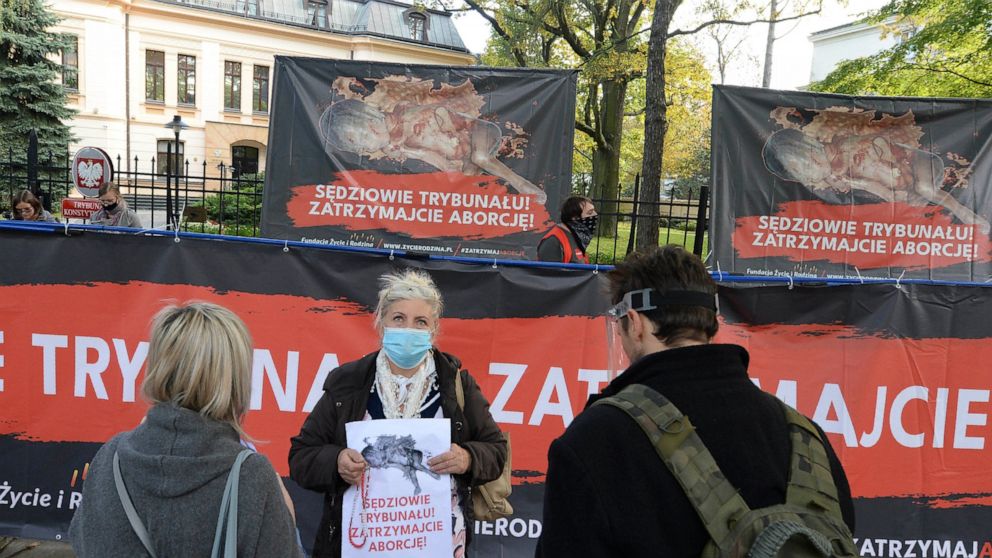
Poland tightened its abortion laws yesterday, making it illegal to end a pregnancy due to foetal defects, which sparked protests across the mainly Catholic country.
After the ruling goes into effect, abortion will only be permissible in Poland in the case of rape, incest or a threat to the mother’s health and life, which make up only around two per cent of legal terminations conducted in recent years.
The development pushes Poland further away from the European mainstream, as the only EU country apart from tiny Malta to severely restrict access to abortion.
Conservative values have played a growing role in public life in Poland since the nationalist Law and Justice (PiS) party came into power five years ago on a promise to defend what it sees as the nation’s traditional, Catholic character.
A long-standing ambition
Curbing access to abortion has been a long-standing ambition of the party, but it has stepped back from previous legislative proposals amid widespread public backlash.
Head of the Constitutional Tribunal Julia Przylebska said: ‘[A provision which] legalises eugenic practices in the field of the right to life of an unborn child and makes the right to life of an unborn child dependent on his or her health is inconsistent with the constitution.‘
Hundreds marched toward the house of governing party leader Jaroslaw Kaczynski on Thursday night after the ruling, some carrying candles and signs that read ‘torture’.
Police in riot gear had cordoned off the house. The Warsaw Police said on Twitter that it reacted with pepper spray and physical force after protesters threw stones and tried to push through the police line.
Small protests also took place in the cities of Krakow, Lodz and Szczecin.
‘It’s sick that such controversial things are being decided at a time when the entire society lives in fear and is afraid to go into the streets,‘ said Marianna Dobkowska, 41.
A group of right-wing lawmakers asked the Tribunal in December 2019 to rule on the legality of aborting when there is serious, irreversible damage to the foetus.
‘Today Poland is an example for Europe, it’s an example for the world,‘ said Kaja Godek, a member of the ‘Stop Abortion’ public initiative, a separate group.
Women’s rights and opposition groups reacted with dismay
‘The worst-case scenario that could have come true has come true. It is a devastating sentence that will destroy the lives of many women and many families,‘ said lawyer Kamila Ferenc who works with an NGO helping women denied abortion.
‘It will especially force the poor to give birth to children against their will. Either they have no chance of surviving, or they have no chance of an independent existence, or they will die shortly after giving birth.‘
Council of Europe Commissioner for Human Rights Dunja Mijatovic called it a ‘sad day for women’s rights.’
‘Removing the basis for almost all legal abortions in Poland amounts to a ban and violates human rights. Today’s ruling of the Constitutional Court means underground/abroad abortions for those who can afford and even greater ordeal for all others.‘
Opponents say the Constitutional Tribunal may have acted on the ruling party’s behalf.
While the Tribunal is nominally independent, most of its judges have been nominated by PiS, some to replace candidates picked by the opposition but whose appointment was refused by President Andrzej Duda, a party ally.
‘To throw in the subject of abortion and produce a ruling by a pseudo-tribunal in the middle of a raging epidemic is more than cynicism. It is political wickedness,‘ said Donald Tusk, head of the main centre-right group in the European Parliament and a former prime minister of Poland.
Many doctors in Poland, which already had some of the strictest abortion rules in Europe, exercise their legal right to refuse to terminate pregnancies on religious grounds. Some say they are pressured into doing so by their superiors.
Maria Kurowska, a lawmaker with United Poland, a party in the ruling coalition with Law and Justice said: ‘We are glad with what the Constitutional Tribunal ruled because one cannot kill a child for being sick. This is not a foetus, it is a child.‘
More news about abortion across the world on DM, Strange Sounds and Steve Quayle.












Thanks be to God for this new law. They call murder of a child a woman’s right. Disgusting and wrong.
Great news. Actions have consequences. Glad to know lives are being saved in Poland.
Birth rates will drop, people will stay single for longer and women will sexualise themselves more: Scientists predict how society will change in a post-COVID world
A multidisciplinary team of experts reviewed 90 studies to make their forecasts
The team predict various social impacts — even among those not infected
Gender inequality could rise due to lockdown, as could social conservatism
The ongoing pandemic is a ‘worldwide social experiment’, the researchers said
By Ian Randall For Mailonline
Published: 19:14 BST, 23 October 2020 | Updated: 19:57 BST, 23 October 2020
e-mail
1.3k
shares
1.4k
View comments
Psychological fallout from the pandemic will cause birth rates to drop, people to stay single for longer and women to sexualise themselves more, experts have predicted.
Experts from the US reviewed 90 studies to help them predict how COVID-19 could shift social behaviours and gender norms — even among those not infected.
They expect planned pregnancies to decrease in response to the global health crisis as people defer marriage and kids, leading some nations’ populations to shrink.
Drops in birth-rates will have cascading impacts on society and economics, affecting such things as job opportunities and support for elderly populations.
Furthermore, the unequal division of the extra household labour brought by lockdown could see gender inequality rise and foster more social conservatism.
In many ways, the researchers noted, ‘the pandemic has become a worldwide social experiment’ — the results of which have yet to finish playing out.
Disclaimer always apply
and this has what to do with strange sounds?